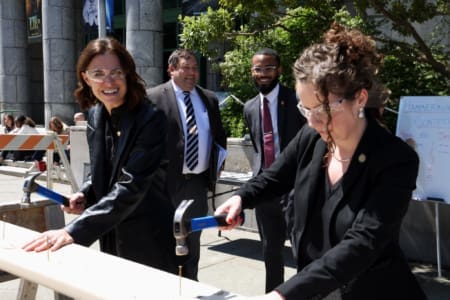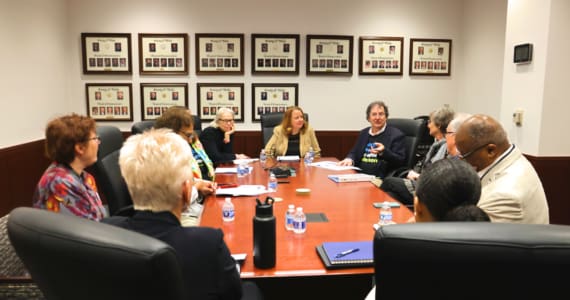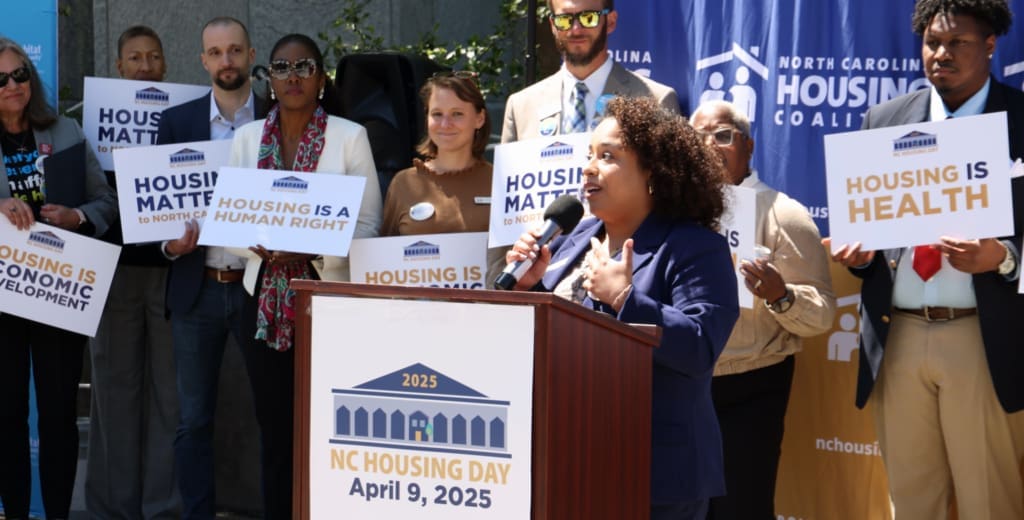
On Wednesday, April 9, more than 100 housing advocates representing over 50 counties from across the state held more than 100 meetings with their legislators for the first annual NC Housing Day 2025. In these meetings, advocates urged their state House and Senate members to make housing a top priority as they develop the state’s next two-year budget and other legislation throughout the 2025 long legislative session. Co-hosted by the NC Housing Coalition, Habitat for Humanity of NC, and the NC Coalition to End Homelessness, the advocacy priorities shared with legislators represented the full spectrum of housing from homelessness to homeownership, and participants had the opportunity to share their firsthand accounts of why housing matters to their communities.
Legislative Asks
Housing Day 2025 legislative asks were based on the NC Housing Coalition’s 2025-2026 Policy Agenda as well as key legislative priorities from co-hosts Habitat for Humanity of NC and the NC Coalition to End Homelessness:
Funding for Housing: Increase housing investments to meet the scale of the need
Disaster Recovery: Meet immediate needs and prepare for future disasters
Protections for Renters and Homeowners: Improve access to quality, affordable housing and prevent displacement
Land Use and Development: Inform local policies and support equitable land use reform
Property Taxes: Support improvements to property tax relief programs
Homelessness: Prevent the criminalization of homelessness
Solutions for Housing in NC
At the NC Housing Day press conference, leaders from each hosting organization highlighted the state’s housing needs and championed solutions that will create thriving, just communities.
“Right now we have more than 1.1 million families across the state that are cost-burdened,” said Samuel Gunter, Executive Director of the NC Housing Coalition. A family is considered cost-burned if they spend more than 30% of their household income on housing. Gunter said, “At its core, we’re talking about a very simple math problem that has two variables: how much does your housing cost, and how much does your household make? And that math gets impossible the further down you go on the income spectrum.”
“Housing costs are rising in NC today, and they’re rising rapidly,” said Paul Reeves, Interim Executive Director of Habitat NC. “Today many North Carolinians struggle to afford a safe place to call home, and if they have a safe place to call home, they’re struggling to stay in that safe place to call home.”

“At our core, we believe that every North Carolinian deserves access to safe, stable, and affordable housing, that it is foundational to educational success, to economic stability, to wellbeing,” Gunter said. “And investing in that housing means supporting those families and individuals and local economies and ensuring that our communities thrive.”
“We’re here talking to [NC state legislators] about funding housing and how these investments have to meet the scale of the need, because they currently do not,” said Stephanie Watkins-Cruz, Director of Housing Policy at the NC Housing Coalition. “We’re here talking to them about equitable disaster recovery, talking to them about removing barriers when it comes to land use and development. We’re making sure that they know that they have the power in order to protect homeowners and renters.”
Dr. Latonya Agard, Executive Director of the NC Coalition to End Homelessness, addressed two state bills that would further criminalize homelessness in NC. “The answer is not to punish people for the things that are happening in their lives,” Dr. Agard said. “The solution is to ensure that we have housing and wraparound services so people can recover and rebuild their lives.”
“There’s so much work to be done, and the folks in this building that we’ve elected have the power to make a lot of good change,” said Watkins-Cruz. “It’s about all of us, it’s about our communities. This is not an us versus them issue, and it’s not a partisan issue.”








